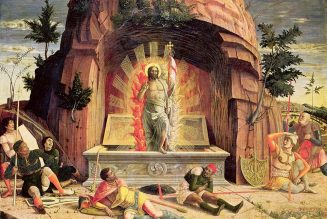By Clement Harrold

St. Paul famously describes the Old Testament patriarch Abraham as our father in faith (see Rom 4:16; Gal 3:7), yet this doesn’t seem to square well with Abraham’s treatment of his wife Sarah on not one but two separate occasions.
On the first occasion, in Genesis 12, we’ve only just been introduced to the figure of Abram and his wife Sarai when the biblical narrator announces to us that due to a famine afflicting his native country, “Abram went down to Egypt to sojourn there, for the famine was severe in the land” (Gen 12:10). Upon his arrival, however, Abram is worried that the Egyptians will kill him in order to take custody of his beautiful wife Sarai.
To avoid this, Abram declares that Sarai is merely his sister, even though he knows this means Pharaoh will want to take her and sleep with her. Not unpleased with the arrangement, Pharoah begins to shower gifts upon Abram, until suddenly God intervenes by casting a plague on the royal household. Realizing he has been deceived, Pharaoh angrily summons and rebukes Abram, and instructs him and Sarai to go on their way.
So far so bad. But the plot thickens further when Abram tries the same trick again, though this time it’s in Genesis 20, and it’s after his and Sarai’s re-naming. On this second occasion, the motivation for Abraham and Sarah leaving their native land isn’t explained, but they end up in the territory of Gerar. Once again, Abraham resorts to manipulation, telling the men of that country that Sarah is his sister. When the local king, Abimelech, takes Sarah to be his concubine, God once more intervenes by appearing in a dream to rebuke the unwitting ruler.
The next morning Abimelech confronts Abraham for his deceit, and this time the dogged patriarch concocts the elaborate excuse that “I didn’t technically lie because Sarah is actually my half-sister, so you can’t really hold me responsible” (see Gen 20:12). Abimelech then sends Abraham on his merry way with some gifts and supplies, and in return Abraham prays to God to avert the disaster which He had threatened to send on Abimelech’s house.
What is the Christian reader of the Scriptures to make of these two bizarre and rather shameful episodes? And what was St. Paul thinking when he praised Abraham in such glowing terms?
The twofold answer to these questions lies in a proper reading of God’s Word and a proper reading of Abraham’s story arc. Beginning with how we approach the Scriptures generally, it is essential to understand that just because something is reported in the Bible, that doesn’t make it good.
Furthermore, just because something is never explicitly condemned by the narrator, that still doesn’t make it good. In fact, many books of the Bible contain stories that are clearly sordid and immoral in nature, and the narrator just assumes that we’ll pick up on the obvious fact that what’s going on is morally wrong.
Turning then to the specific case of Abraham, that is exactly what we see going on in these two perplexing passages from Genesis 12 and 20. What these two stories relate is a particular spiritual failing on the part of Abraham. We see this implicitly in the text just in the fact that Abraham is described as leaving his native land—the future promised land—to travel to a pagan nation.
Abraham’s spiritual failing is also highlighted by God’s response to the whole situation. What does God do following the patriarch’s trickery? On both occasions, he dramatically intervenes to protect Sarah’s dignity and put an end to the duplicity, thereby offering a not-so-subtle rebuke to Abraham’s misdeeds. Indeed, across the narratives God consistently reveals Himself to be a protective Father who doesn’t respond lightly when selfish men seek to exploit His beloved daughter.
More than any of these other elements, however, the aspect of the story which condemns Abraham more than any other is his evident lack of faith in God’s providential power. On both occasions, Abraham finds himself in a situation where he feels endangered and threatened. But what is his response? Instead of invoking divine aid, he turns to deception in a desperate attempt to save his own skin not by prayer but by trickery.
The first of the two episodes is especially damning in this respect. Right at the beginning of Genesis 12, God shows to Abraham the beautiful land which he and his descendents will inherit. And what’s the very next thing Abraham does? He leaves at the first sign of danger! The moment a famine comes along, Abraham abandons the land given to Him by God, not trusting that the Lord will take care of him and his family.
When we read these biblical stories correctly, therefore, we begin to realize the deep spiritual lessons that they contain. Abram starts out as a desperately flawed and human figure. This is the guy, we should remember, who tries sleeping with his concubine because he doesn’t believe that God is capable of providing him a son through his elderly wife. And what’s so striking is that Abram continues to mess up even after he’s formed a covenant with the Lord, and even after he’s renamed as Abraham.
So what changes? From a narrative perspective, it’s really Genesis 22—the binding of Isaac, the Akedah—which marks the decisive turning point in Abraham’s spiritual life. Up to now, he’s had his fair share of faults and failings. But it is in the Akedah that we meet the mature Abraham, the righteous Abraham, the childlike Abraham, who has finally learned to put his trust in God, and to lean entirely on Him, even to the point of trusting that the sacrifice of his only son will not end in death.
This is the patriarch who St. Paul called our father in faith. He’s the patriarch who didn’t start out with deep faith, but who in time found it by journeying with God. The first person in the Bible ever to be described as a prophet, Abraham is a reminder to us that God’s prophets and leaders are often far from perfect (see Gen 20:7).
While the Lord delights in using imperfect instruments like you and me, He’s never content to stop at our brokenness. He always has bigger plans for us than we have for ourselves; and He longs to bring us on a journey of ever-deepening trust, just as He did all those millenia ago with Abraham, our father in faith.
Clement Harrold is a graduate student in theology at the University of Notre Dame. His writings have appeared in First Things, Church Life Journal, Crisis Magazine, and the Washington Examiner. He earned his bachelor’s degree from the Franciscan University of Steubenville in 2021.
You Might Also Like
In Swear to God, Dr. Scott Hahn explores the richness of Christ’s sacraments—their doctrine, history, symbols, and rituals. Drawing upon the Bible and the Church’s tradition, he shows how God’s covenants—with Adam, Noah, Abraham, Moses, and David—became the driving forces in history. When Jesus came to fulfill all these covenants, He established a new covenant, with greater power than ever before. Christians are God’s children now. Joined to Christ by baptism, we can already share in the eternal life of the Trinity, a life we hope to know fully in heaven. But heaven is with us, even now, in the sacraments.









